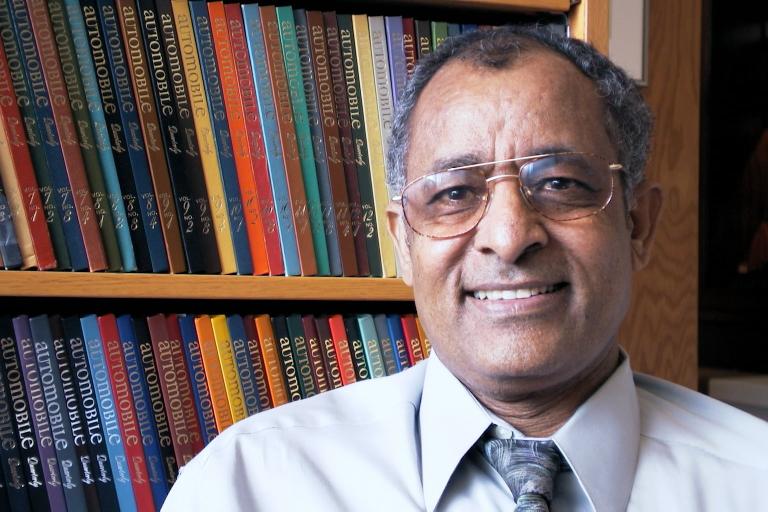
Having friends in high places is necessary - having friends in the RIGHT place is, and the Eritrean Institute of Technology and Teacher Education in Eritrea has a good friend in Dr. Petros Gheresus, professor of Industrial Engineering in the Industrial and Manufacturing Engineering and Business Department, at Kettering University.
Gheresus visited Eritrea's new Institute in Mai Nefhi, Eritrea, in November and December of 2004, to teach and continue to foster a relationship between Kettering and the Institute.
Eritrea is a small country on the northeastern coast of Africa approximately the size of Pennsylvania. Its 4.5 million inhabitants represent nine ethnic groups and languages. The population is about 50 percent Muslim and 50 percent Christian. Awarded to Ethiopia in 1952, Eritrea won independence from Ethiopia after a 30-year war that ended in 1991. A two-year border struggle with Ethiopia ended under United Nations authority in 2000.
Gheresus took lecture materials and textbooks and spent two weeks teaching computer programming to 25 Institute faculty and administrators. "The lecture materials and the textbooks I brought with me will be used by the faculty to teach the students," said Gheresus.
In addition he presented Kettering University's cooperative education system to administrators and faculty at the Institute and as well as to administrators and department heads at the Ministry of Education Center. "The concept of cooperative education was very well received by the Institute's faculty, administrators, Dr. Ghebrebrahn Ogubazghi Academic-vice president, and His Excellency Osman Saleh, Eritrea's minster of Education," Gheresus said.
Through Gheresus, Kettering has contributed to Eritrea's educational endeavors since 2002, when more than six tons of instructional and library reference text books were collected and shipped to Asmara University. Half of the donation of textbooks were collected by members of AEFM (Association of Eritreans in Michigan). Kettering University provided a storage space, use of the University shipping facility and funding for shipping the books from Kettering to New Jersey, and then they were shipped to Eritrea.
Currently the Institute has acute shortages of faculty, textbooks and technology resources to serve its 8,500 students. To address the shortages, the Institute is recruiting faculty from India and soliciting donations of textbooks to be used for teaching and library references. Gheresus is working to secure as many textbooks as possible to be shipped to the Institute. "My future plans are to build a strong educational bridge between Kettering University and the Institute and serve as conduit to promote this endeavor," he said.
"My immediate goal is to invite the Eritrean minister of Education and the Institute's administrators and educators to visit Kettering University and surrounding colleges to guide and assist with curriculum and laboratory development and to strengthen future collaborations " he said.
"My experience working at the Institute was very rewarding," said Gheresus. "I became more aware and appreciative of the facilities and resources that Kettering provides its faculty, staff, and students compared to what is available at the Institute in Eritrea."
Written by Dawn Hibbard
(810) 762-9865
dhibbard@kettering.edu